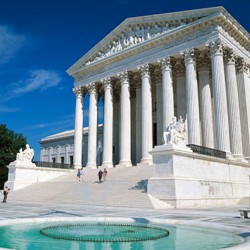Regulated Sports Betting in NJ Would Help iGaming Market

New Jersey is slowly inching closer towards its intended goal of legalizing sports betting, and recently took another step forward when it filed its case with the US Supreme Court. The Garden State is now awaiting for an opportunity to present its legal argument to the eight associate justices and the Chief Justice, with the ruling’s outcome set to have a profound impact on the future of sports betting in the country of 323 million people.
PASPA of 1992
This important fight has its roots in the Professional and Amateur Sports Protection Act (PASPA) of 1992, which was a national sports betting ban put in place by the federal government permitting just Nevada to offer sports betting, as well as Delaware, Oregon, and Montana on a more limited basis. At the heart of the issue is the idea that states should be able to determine what their laws are, instead of the federal government getting the final say. Needless to say, the end result of this hearing will impact all future cases related to the country’s federal gambling acts, such as the Unlawful Internet Gambling Enforcement Act (UIGEA) and the Wire Act.
NJ Sports Law of 2012
Governor Chris Christie, the New Jersey legislature, as well as most of the voters in the state of New Jersey, have all shown their support for legalized sports betting in the past. In fact, a law was introduced back in 2012 allowing racetracks and land-based casinos to file sports betting license applications for both professional and amateur sports events. Still, that same year, a lawsuit was subsequently filed against Christie stating that the law violated PAPSA, and the battles have continued in court ever since, finally leading to an impending showdown in the United States Supreme Court.
State Rights at Risk
Sstate rights was one of the issues at the center of anti-online gambling and poker laws which were overturned after the UIGEA was reinterpreted in 2011. This then led to Nevada, Delaware and New Jersey launching their own regulated internet gambling industries a couple of years later. Yet, there are still politicians in Congress who are intent on reinstating a federal ban on these acts, and if they are successful with their efforts, state rights will certainly have been trampled upon by the federal government. As the state of New Jersey wrote in its filing:
“To meet Congress’ objective of forestalling further legislation of sports wagering, PASPA directs states to maintain, in effect, their state-law prohibitions on the activity. Our constitutional structure does not permit Congress to regulate interstate commerce in that manner. Under our Constitution, if Congress wishes for sports wagering to be illegal, it must make the activity unlawful itself. It cannot compel states to do so.”
Benefits of Sports Betting
If New Jersey is able to legalize sports betting, it could have a significantly positive effect on the US gambling industry, with some estimates placing the sports betting market’s figure as somewhere in the region of $150 billion. Furthermore, it could also help support an extra 152,000 jobs, have an economic impact of around $26 billion, as well as generate about $5.3 billion in annual tax revenue throughout the country. As far as New Jersey is concerned, the state would also be uniquely positioned to take advantage of sports betting regulation, and as Atlantic City Mayor Don Guardian explains:
““Since Atlantic City already enjoys online Internet gaming, the introduction of sports betting will be an easy addition for us. We will be able to attract sports fans from all over the world, inviting them to spend a few nights in Atlantic City to watch amazing sporting events like the Super Bowl, the Kentucky Derby and so much more. If sports betting is approved, Atlantic City will continue to be a leader in this industry.”
Online Gambling Next?
On the other hand, if anti-online gambling advocates such as US Representatives Charlie Dent and Brian Fitzpatrick get their way and succeed in having a federal ban of gambling online implemented, then this would set a negative message to other US states that assert that they should be allowed to have all of the power when it comes to making decisions on gambling.
In other words, the future of US online gambling is going to need a positive decision from the United States Supreme Court case on sports betting if it is going to send out a positive message on state rights. A decision that leans toward PAPSA, though, will keep the light on for supporters of RAWA and other types of similar legislature. While this may not automatically stop online gambling games from running in Nevada, New Jersey and Delaware, these states could then eventually be forced to defend their positions in court, and for this reason, all eyes are currently on New Jersey and the case currently in front of the Supreme Court. A decision on the issue, however, is not expected until next spring.










